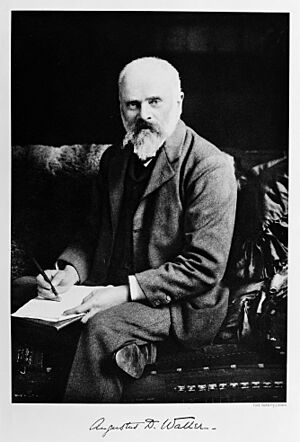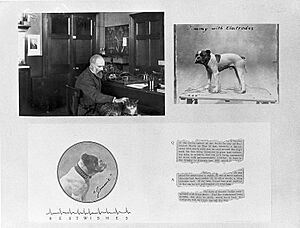Augustus Desiré Waller facts for kids
Augustus Desiré Waller (born July 12, 1856 – died March 11, 1922) was a British scientist who studied how the body works. He was known as a physiologist. He was also the son of another famous physiologist, Augustus Volney Waller. Augustus Desiré Waller was born in Paris, France.
Contents
Who Was Augustus Waller?
Augustus Desiré Waller was a very important scientist. He made a machine that could record the electrical signals of the human heart. This machine is called an ECG machine. ECG stands for electrocardiogram. It helps doctors understand if a person's heart is working well.
Early Life and Studies
Waller studied medicine at Aberdeen University in Scotland. He finished his studies in 1878. Later, in 1881, he earned his M.D. degree.
In 1883, he started teaching about how the body works at the London School of Medicine for Women. There, he met Alice Palmer, who was one of his students. Alice later became his wife. Her father, George Palmer, was a Member of Parliament and helped start the famous biscuit company, Huntley and Palmer.
A Big Discovery: The ECG Machine
In 1884, Waller became a teacher at St Mary's Hospital. In 1887, he used a special device called a capillary electrometer. With this device, he made the very first recording of a human heart's electrical activity. This was the first human electrocardiogram!
Waller then created the first practical ECG machine. This machine used electrodes placed on the skin. He traveled around Europe and America to show how his machine worked. He often used his dog, Jimmy, for these demonstrations. Jimmy would lie still while Waller showed how the ECG recorded his heartbeat.
At first, Waller didn't think his ECG machine would be very useful in hospitals. He thought it was more for research. However, other scientists, like Willem Einthoven and Thomas Lewis, saw its potential. They showed Waller that the heart recordings could help doctors find out if someone had heart problems.
Later Career and Legacy
In 1896, Waller was given a special job. He became the Fullerian Professor of Physiology at the Royal Institution. This was a very respected position.
A few years before he passed away, in 1917, Waller published a big study. He looked at over 2000 different heart recordings. This helped show how useful the ECG was for understanding heart conditions.
Augustus Desiré Waller died in London on March 11, 1922. He had suffered from two strokes. His work with the ECG machine changed how doctors check on our hearts today.
 | Isaac Myers |
 | D. Hamilton Jackson |
 | A. Philip Randolph |



